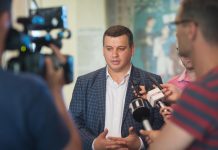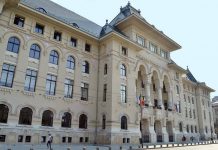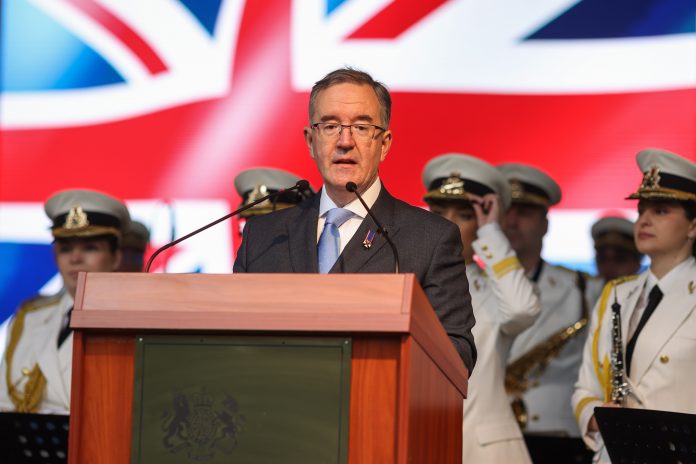British Ambassador to Romania, Andrew Noble, was driving across Europe towards Bucharest in August 2018, days before the biggest anti-corruption protest of recent times.
The ruling Social Democratic Party was in the midst of its infamous judicial overhaul that the European Union, the U.S. and many Romanians worried about. They saw it as undermining the rule of law, designed to give a carte blanche to corrupt officials and drag Romania backwards.
Andrew James Noble, LVO, (the Royal Victorian Order, an order of knighthood) who is one of the UK’s most seasoned diplomats anywhere, arrived on Wednesday, two days ahead of the August 10 demonstration which turned violent. More than 200 people, protesters and riot police, needed medical care after security forces used tear gas and water cannons to disperse anti-corruption demonstrators when tens of thousands of people rallied against the government.
Romania’s then-Prime Minister Viorica Dancila left town, so did Bucharest Mayor Gabriela Firea. The women are no longer in the frontline of Romanian politics even as a new, improved version of the Social Democratic Party remains in government.
Mr Noble, 63, is on a high as he retires and leaves Romania, a place he first came to as a young diplomat in the 1980s when Nicolae Ceausescu was in power. Actually he’s „overwhelmingly sad” about going but positive about changes and plans to keep the relationship with Romania going after „an intense five years.”
This year he welcomed King Charles III on his first visit abroad since his coronation on May 6 and the Archbishop of Canterbury, Justin Welby.
The Ambassador is also vastly more optimistic about the country, much more so than many Romanians. Not because the country clearly has a place in his heart, but because he is in full possession of the facts and knows how to interpret them.
In short, Romania is doing incredibly well, he says. Its GDP is better than Greece and Croatia, but it doesn’t seem to grasp the reality, and its leaders haven’t managed to get the message across.
UK-Romanian relations are solid, with both sides cooperating on Ukraine, security and human trafficking. So it’s a good time to leave in three weeks’ time, looking at the situation from a purely professional point of view.
Foreign Office
During his 41-year career with the British Foreign Office, Mr. Noble served as ambassador to Algeria and also worked in Germany, South Africa and Greece.
In the wide-ranging interview with Universul.net, Mr. Noble talked about human trafficking, Schengen and radioactive parsley.
One thing he’s looking forward to: making a cozonac with the aid of a dough hook. (Ed’s note:a curved attachment specifically made for kneading dough.)
Here are the highlights of the interview on September 28, in the Ambassador’s own words.
August 10
When I came to Romania, “I knew about #rezist (Ed’s note: slogan for anti-corruption protests) and the protests of 2017 but Aug. 10 was the last big demonstration,” he said. “I didn’t participate. People at the embassy were at it and gave a first-hand account… I’m very glad that I saw what is the last big public demonstration of political will on the streets…. (It was an) important component of how Romania ticks.”
He wryly notes that Romania has had five Romanian prime ministers since his arrival…. while Britain has had four.
Romania is ‘normal’
It’s gone from “Romania risking becoming a pariah in Europe, with the assault on the rule of law, to a Romania that is essentially normalized. Romania is a normal country now. It’s finished its transition out of communism; it’s got big challenges like every democratic country.
„People in Romania still think that a lot of Romania’s problems are Romania-specific and there are examples of Romania not having made it, whereas in fact pretty much everything has a set of comparable issues in pretty much other advanced democracies.”
Internal narrative
But the internal narrative about where is Romania is one that fails two basic tests, I think. One, it fails to make to adequate international comparisons. But the biggest problem is that people don’t know where Romania came from. The population born since 1989 is one thing, but the population that became adult, those who are 44 and below, doesn’t remember adult Romania. They had their memories of childhood, but not their memories of working and feeding a family.
He mentioned a book written by an American-Lithuanian writer Ruta Sepetys published in 2022 called “I Must Betray You.”
It’s “a fabulous book written for adolescents about a small number of Romanian adolescents in 1989—and it ends with their involvement in the revolution…It’s a book that provides young people with essential facts about living under communism, it’s really easy read, the chapters are 2 1/2 pages, it’s dynamic, written from perspective of a 17-year-old.”
Communism
„You quickly realise what life was like under communism. Reflective teenagers and older people will realise that from that to what we’ve got today is a massive, massive improvement and one that’s been achieved since 1996 (Ed’s note: when Emil Constantinescu defeated Ion Iliescu in the presidential ballot). 1989 to 1996 was a fallow period for change,” he said.
In 1989, nobody had an alternative idea. Nobody had been having alternative thoughts even privately about how to run a political system, an economy, or a society. It was one of the elements in which you could say Romania had almost bled to death by 89.
People were just concentrating on surviving and intellectual life had ended. If you compare Hungary which began its economic transition in the 1950s, and Romania who began it in 1996 and what their relative positions now are in economic terms, you very quickly realise that Romania has done spectacularly well, overtaken Greece and Croatia in terms of GDP. Who’d believe that?
Achievements
If you look at our UK-Romania relationship and see its trajectory, you’d find it very difficult to say at what point along that rising curb did Brexit happen, because we prepared for Brexit, and we prepared to maintain this relationship. This wasn’t about diminishing our relationship with Romania and Europe as a whole and I think we achieved that really effectively.
Our cooperation on the security of our people is at an all-time high. 2,000 British troops in country this year on exercises and the like as well as other things. The Romania-Britain mindset on Ukraine is absolutely identical (Ed’s note: at a government level). I am intensely proud of that and how my colleagues have contributed to that.
Trafficking
Another achievement is “what we’ve been doing to address the questions that contribute to people being trafficked from Romania. A country that is richer per head than Greece should not have a problem of modern slavery and yet we know that Romanians are one of the top four foreign nationals trafficked to the UK. It should be a matter of shame. Others are South Sudan, Eritrea and Vietnam. Just shocking. But if you look at poverty for those marginalized, exclusion of Roma, the disabled, LGBT community not given full human rights and women still suffering a bad level of violence of all types in private, doing reasonably well in public, glass ceiling isn’t really here in most parts of the country apart from possibly politics. But even there, the 2nd citizen of the country (Ed’s note: Senate speaker) has been a woman twice in these 5 years.
Do Romanian men iron clothes?
„We know that in private there is a big problem and there isn’t functional equality. I don’t know how many Romanian men do as much ironing and cooking as much as my peers would in the UK, but I suspect it is a lot less. Those are the things that continue in marginalized communities. An absence of life prospects which make them look for false opportunities overseas; the grooming of girls that takes place in marginalized communities is a terrible problem.”
„Our embassy has been very vocal. I think we’ve had some success in supporting the government’s use of and discussion with NGOs and that’s one of things we weren’t doing five years ago that we are doing and will continue to do. It will take a long time, but if you don’t start now, it will take even longer.”
Where is Romania in 2023? I understand from you that they are getting the narrative wrong
Romania’s internal narrative is weak, it is quiet, it’s close to non-existent. As a British civil servant, if I were sitting with the circumstances that Romania has got, I know that my ministers would be pushing me to write more material making clear what our achievements were. There are achievements by the yard in Romania that nobody talks about, including the fundamental economics of the country, which are transformed. And the fact that it is not a country in transition anymore.
It’s becoming a mature country, not with a long tradition. That will take a long time. It’s fully within the pack of advanced democracies with a big challenge on rural development and health and education. But guess what? We’ve all got exactly the same challenges: different identity, same challenge.
Schengen will bring migration, boost economy
There is one area in which Romania hasn’t yet got the challenges which is migration. But migration will arrive as soon as Schengen arrives. I hope that’s an area that people realise that in order to really profit from Schengen, people will really need to welcome the new populations that arrive because it’s a land of huge need for labor, huge economic potential to grow and if people arrive to do jobs, that will help Romania’s economy, which will help the government spend more on education and health and roads and everything else people want.
Good moment to leave?
It’s difficult to answer that without being overwhelmingly sad about leaving. In a bureaucratic sense, it’s a good time, there is a stable government, we’re a year ahead of elections which pose particular challenges. Our two governments are in a very strong position, and so it’s a relatively stable place in which to hand over the baton. We are not in a crisis, although the Ukraine crisis is with us every day. We’re not like we were in the first month (Ed’s note: February-March 2022) where we were having to invent how we respond; our relationship has now accepted that coordination on Ukraine topics is part of the new everyday, and it works extremely well. So, it works extremely well. It is a good time in that sense.
Remembering the dark days of communism, Chernobyl
I was on the Ukrainian border when the clouds went over. I remember when I got back to Bucharest, I had to be tested if I was bringing back high levels of radiation on my clothes and on me. I had to collect samples of local vegetation and surface water. I can remember standing somewhere in Neamt (Ed’s note: county in northeast Romania), emptying Evian water on to the roadside in order to have bottles to collect water from a reservoir. This water had cost a fortune. Even at the time I was thinking: “My God. What am I doing?”
Radioactive parsley
„There was a radiation hotspot in the front garden of the embassy. The residence had a kitchen garden, and they grew all their own vegetables as you had to (Ed’s note: great shortages of basic food in the late 1980s). All of that had to be tested by the Geiger counter. The parsley was off the scale in terms of radioactivity. Everything else was much better. It is the way parsley grows and what it absorbs.”
Goodbye or farewell?
„If you’ve lived in Romania this intensively for five years and it has been very intense, the days are very long. The weeks are seven days and even if you’re on holiday in Romania, travelling around, you are not on holiday. It is a very, very intense experience and I don’t think you can just put it down. And I wouldn’t want to. I will be back on a visiting basis. Very low profile. I have an excellent successor and the last thing he needs is his predecessor kicking around under his feet and I will not be making that mistake. But I will be contributing.. I am on a board of a major NGO and I’ll be doing other things with Romania, I hope. (I’m) not even decided. I find it inconceivable that we won’t be back as a family and individually. Our kids (Ed’s note: Andrew and Helen Noble have four children) have had a wonderful time here too and I know they have their favourite places and their favourite guesthouses and they want to come back.
What’s it like to be an ambassador?
Being an ambassador is a tricky job. You’re a public person for the first time in your career. And for the first time in your career, you are utterly dependent on the team behind you. It’s their work, it’s their connectivity that you front up. In all other jobs, it was generally speaking my efforts and at a much lower level and no public figure about it. It’s a curious way to discover you have an entirely different profession at the end compared to the last 30 years. But good fun.
Happy you came to Romania in this stage of your career, not when you were 30?
When I was 30, I was contributing to the process of EU accession and then when I was 40 I was contributing to the process of NATO membership. And from a London perspective, I was involved in developing Romania’s counter-terrorist capability. I’ve done bits when I haven’t been here. But to start here and to finish here is a rather special way of doing it. In some ways, I am very glad I am retiring from here because when I compare what British ambassadors are able to achieve in comparable countries or more advanced countries, what they can achieve is far more subtle to describe, i.e less. It would be difficult to find the level of job satisfaction. And also “Are there any warmer people in Europe than the Romanians? We know that there’s no better balance of nature anywhere else. There’s nowhere else we can get sarmale with smantana. So, where would I want to go after Bucharest?”
What about the Cozonac?
The Ambassador is known for his cooking skills and whipped up a dish of steaming sarmale for viewers during the pandemic. „My cozonac approach is going to be different. The only time I’ve made cozonac so far, I kneaded it by hand. Oh my word, my arms ached. But I know that I am going to use my dough hook when I make cozonac. Have you made cozonac? Me: ‘no.’ It’s incredibly wet dough. You put your hands in the dough and you can’t get them out. It feels like kneading wet cement and only after 20 minutes do you start to get any elasticity and only after half an hour your arms are exploding. So it’s the dough hook from now on.
Universul.net wishes Andrew Noble ‘Multumesc” and „Drum Bun.” It’s „La Revedere” as we’re sure he’ll be back in Romania soon.
Romanian lawmaker calls for justice for hundreds of victims of ‘state violence’ during 2018 protest

















